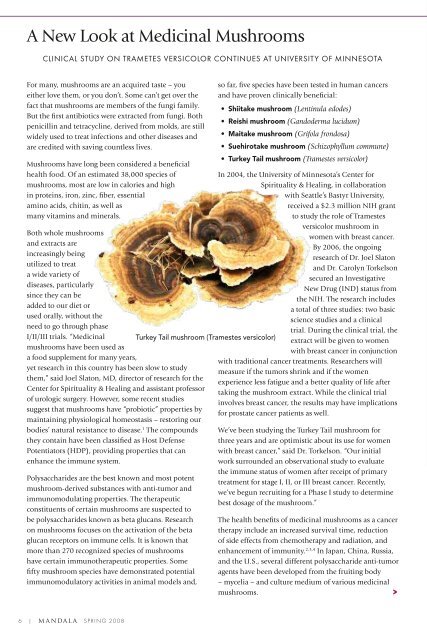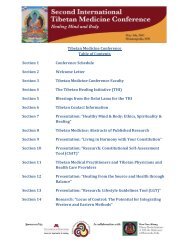Pillsbury House Integrated Health Clinic - Center for Spirituality and ...
Pillsbury House Integrated Health Clinic - Center for Spirituality and ...
Pillsbury House Integrated Health Clinic - Center for Spirituality and ...
Create successful ePaper yourself
Turn your PDF publications into a flip-book with our unique Google optimized e-Paper software.
A New Look at Medicinal Mushrooms<br />
CLINICAL STUDy ON TRAMETES vERSICOLOR CONTINUES AT UNIvERSITy OF MINNESOTA<br />
For many, mushrooms are an acquired taste – you<br />
either love them, or you don’t. Some can’t get over the<br />
fact that mushrooms are members of the fungi family.<br />
But the first antibiotics were extracted from fungi. Both<br />
penicillin <strong>and</strong> tetracycline, derived from molds, are still<br />
widely used to treat infections <strong>and</strong> other diseases <strong>and</strong><br />
are credited with saving countless lives.<br />
Mushrooms have long been considered a beneficial<br />
health food. Of an estimated 38,000 species of<br />
mushrooms, most are low in calories <strong>and</strong> high<br />
in proteins, iron, zinc, fiber, essential<br />
amino acids, chitin, as well as<br />
many vitamins <strong>and</strong> minerals.<br />
Both whole mushrooms<br />
<strong>and</strong> extracts are<br />
increasingly being<br />
utilized to treat<br />
a wide variety of<br />
diseases, particularly<br />
since they can be<br />
added to our diet or<br />
used orally, without the<br />
need to go through phase<br />
I/II/III trials. “Medicinal<br />
mushrooms have been used as<br />
a food supplement <strong>for</strong> many years,<br />
yet research in this country has been slow to study<br />
them,” said Joel Slaton, MD, director of research <strong>for</strong> the<br />
<strong>Center</strong> <strong>for</strong> <strong>Spirituality</strong> & Healing <strong>and</strong> assistant professor<br />
of urologic surgery. However, some recent studies<br />
suggest that mushrooms have “probiotic” properties by<br />
maintaining physiological homeostasis – restoring our<br />
bodies’ natural resistance to disease. 1 The compounds<br />
they contain have been classified as Host Defense<br />
Potentiators (HDP), providing properties that can<br />
enhance the immune system.<br />
Polysaccharides are the best known <strong>and</strong> most potent<br />
mushroom-derived substances with anti-tumor <strong>and</strong><br />
immunomodulating properties. The therapeutic<br />
constituents of certain mushrooms are suspected to<br />
be polysaccharides known as beta glucans. Research<br />
on mushrooms focuses on the activation of the beta<br />
glucan receptors on immune cells. It is known that<br />
more than 270 recognized species of mushrooms<br />
have certain immunotherapeutic properties. Some<br />
fifty mushroom species have demonstrated potential<br />
immunomodulatory activities in animal models <strong>and</strong>,<br />
Turkey Tail mushroom (Tramestes versicolor)<br />
so far, five species have been tested in human cancers<br />
<strong>and</strong> have proven clinically beneficial:<br />
•<br />
•<br />
•<br />
•<br />
•<br />
Shiitake mushroom (Lentinula edodes)<br />
Reishi mushroom (G<strong>and</strong>oderma lucidum)<br />
Maitake mushroom (Grifola frondosa)<br />
Suehirotake mushroom (Schizophyllum commune)<br />
Turkey Tail mushroom (Tramestes versicolor)<br />
In 2004, the University of Minnesota’s <strong>Center</strong> <strong>for</strong><br />
<strong>Spirituality</strong> & Healing, in collaboration<br />
with Seattle’s Bastyr University,<br />
received a $2.3 million NIH grant<br />
to study the role of Tramestes<br />
versicolor mushroom in<br />
women with breast cancer.<br />
By 2006, the ongoing<br />
research of Dr. Joel Slaton<br />
<strong>and</strong> Dr. Carolyn Torkelson<br />
secured an Investigative<br />
New Drug (IND) status from<br />
the NIH. The research includes<br />
a total of three studies: two basic<br />
science studies <strong>and</strong> a clinical<br />
trial. During the clinical trial, the<br />
extract will be given to women<br />
with breast cancer in conjunction<br />
with traditional cancer treatments. Researchers will<br />
measure if the tumors shrink <strong>and</strong> if the women<br />
experience less fatigue <strong>and</strong> a better quality of life after<br />
taking the mushroom extract. While the clinical trial<br />
involves breast cancer, the results may have implications<br />
<strong>for</strong> prostate cancer patients as well.<br />
We’ve been studying the Turkey Tail mushroom <strong>for</strong><br />
three years <strong>and</strong> are optimistic about its use <strong>for</strong> women<br />
with breast cancer,” said Dr. Torkelson. “Our initial<br />
work surrounded an observational study to evaluate<br />
the immune status of women after receipt of primary<br />
treatment <strong>for</strong> stage I, II, or III breast cancer. Recently,<br />
we’ve begun recruiting <strong>for</strong> a Phase I study to determine<br />
best dosage of the mushroom.”<br />
The health benefits of medicinal mushrooms as a cancer<br />
therapy include an increased survival time, reduction<br />
of side effects from chemotherapy <strong>and</strong> radiation, <strong>and</strong><br />
enhancement of immunity. 2,3,4 In Japan, China, Russia,<br />
<strong>and</strong> the U.S., several different polysaccharide anti-tumor<br />
agents have been developed from the fruiting body<br />
– mycelia – <strong>and</strong> culture medium of various medicinal<br />
mushrooms. ><br />
Alternative treatments <strong>for</strong> the MRSA ‘Superbug’<br />
TEA TREE OIL SHOWS PROMISE AS AN ANTIMICROBIAL TREATMENT<br />
In the past year, news of methicillin-resistant<br />
Staphylococcus aureus outbreaks – more commonly<br />
referred to as MRSA – have driven the American public<br />
(<strong>and</strong> media) into a collective frenzy. This past fall, the<br />
<strong>Center</strong>s <strong>for</strong> Disease Control (CDC) revealed that 94,000<br />
Americans were infected with MRSA in 2005, resulting<br />
in 19,000 deaths. One public health official went so<br />
far as to say that MRSA could result in more deaths<br />
than AIDS. And an eastern Kentucky school district,<br />
after confirming one case of antibiotic-resistant staph<br />
infection, went so far as to shut down all 23 of<br />
its schools.<br />
However, while the CDC numbers may seemingly jump<br />
off the page, it is important to note that the recent study<br />
is the first of its kind. “We are not interpreting these<br />
numbers as a rise in MRSA, because nothing like this has<br />
ever been done be<strong>for</strong>e,” said Monina Klevens, a medical<br />
epidemiologist <strong>for</strong> the CDC <strong>and</strong> lead author of the study.<br />
“It’s a baseline against which we can compare future<br />
numbers. With the increased concern about community<br />
outbreaks of MRSA, we wanted to know how widespread<br />
the infections are.” It’s true that in recent years resistant<br />
strains of the germ have become more common in<br />
healthcare settings (i.e. hospitals <strong>and</strong> nursing homes).<br />
But what worries most is its increasing incidence in<br />
community environments – like schools, health clubs,<br />
<strong>and</strong> locker rooms. Some speculate that the staph strains<br />
responsible <strong>for</strong> these infections might be even more<br />
aggressive than strains found in hospitals where they<br />
are typically discovered <strong>and</strong> treated more quickly.<br />
For more than 30 years, there have been recurring<br />
reports of the efficacy of Melaleuca alternifolia (Tea Tree)<br />
essential oil against bacterial pathogens. Linda Halcón,<br />
PhD, MPH, RN, faculty at the <strong>Center</strong> <strong>for</strong> <strong>Spirituality</strong> &<br />
> Through the years, natural products have become a major<br />
resource <strong>for</strong> drug discovery. Between 1983 <strong>and</strong> 1994,<br />
520 new drugs were approved in the U.S. <strong>and</strong> of those,<br />
157 were derived from natural products. Meanwhile,<br />
more than 60 percent of antibacterials <strong>and</strong> anticancer<br />
drugs originated from natural products. 4 “The potential<br />
use of medicinal mushrooms <strong>for</strong> disease prevention<br />
<strong>and</strong> treatment is an exp<strong>and</strong>ing target <strong>for</strong> research <strong>and</strong><br />
development,” said Dr. Slaton.<br />
To know more<br />
RESEARCH<br />
Healing <strong>and</strong> director of graduate studies <strong>for</strong> the <strong>Center</strong>’s<br />
graduate minor in Complementary Therapies & Healing<br />
Practices is an advocate <strong>and</strong> researcher of tea tree oil.<br />
“The use of tea tree oil as an alternative topical<br />
decolonization agent <strong>for</strong> MRSA has produced promising<br />
results in case studies <strong>and</strong> small clinical trials,” Halcón<br />
states. “Based on results from laboratory <strong>and</strong> animal<br />
studies, we see several likely mechanisms by which<br />
tea tree oil’s topical use could facilitate healing in<br />
Staphylococcus-infected wounds. In fact, preliminary<br />
studies suggest tea tree oil to be beneficial as an<br />
alternative treatment in cases of where there is antibiotic<br />
resistance.”<br />
However, Dr. Halcón cautions that more research is<br />
necessary. “Rigorous clinical trials are the next step,”<br />
she says. “So far, clinical research on tea tree oil has been<br />
limited. Although published studies are promising, most<br />
have been case studies, employing small numbers, or<br />
have been uncontrolled. I’d like to see more controlled<br />
clinical trials to demonstrate the efficacy <strong>and</strong> safety of<br />
low-cost botanical treatments such as tea tree oil.”<br />
For more in<strong>for</strong>mation about tea tree oil studies,<br />
including MRSA-related research, please visit<br />
the University of Western Australia Tea Tree Oil<br />
Research Group:<br />
http://www.tto.bcs.uwa.edu.au/<br />
TTO_home<br />
To know more<br />
For full references <strong>and</strong> more in<strong>for</strong>mation about<br />
the <strong>Center</strong>’s mushroom research, please visit:<br />
http://www.csh.umn.edu/csh/<br />
research/home.html<br />
<strong>and</strong> click on “Medicinal Mushrooms Research.”




